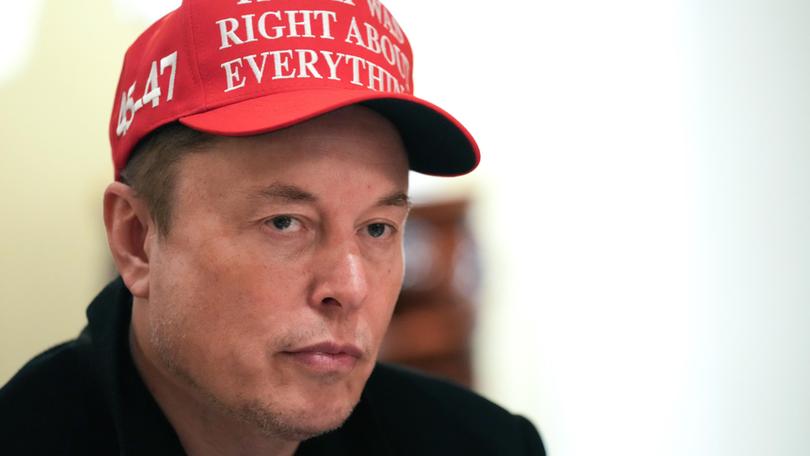Tesla Q1 2025 earnings plunge with automotive revenue dropping 20 per cent amid Trump tariff uncertainty
First-quarter earnings for Tesla missed expectations massively, with CEO Elon Musk’s political involvement and global trade tensions adding pressure to the electric vehicle giant’s struggling performance.

Tesla reported a miss on the top and bottom lines in its first-quarter earnings report on Tuesday as automotive revenue plunged 20 per cent from a year earlier.
Here are the key numbers compared with LSEG expectations.
- Earnings per share: 27 cents adjusted vs. 39 cents estimated
- Revenue: $US19.34 billion ($AUD 30.34 billion) vs. $US21.11 billion ($AUD 33.12 billion) estimated
Sign up to The Nightly's newsletters.
Get the first look at the digital newspaper, curated daily stories and breaking headlines delivered to your inbox.
By continuing you agree to our Terms and Privacy Policy.Total revenue slid 9 per cent from $US21.3 billion a year earlier. Automotive revenue dropped 20 per cent to $US14 billion from $US17.4 billion in the same period last year.
Tesla said one reason for the decline was the need to update lines at its four vehicle factories to start making a refreshed version of its popular Model Y SUV. The company also pointed to lower average selling prices and sales incentives as a drag on revenue and profit.
Net income plummeted 71 per cent to $US409 million, or 12 cents a share, from $US1.39 billion or 41 cents a year ago.
It’s been a brutal start to the year for Tesla, with CEO Elon Musk spending much of his time in President Donald Trump’s White House, overseeing an effort to dramatically downsize the federal government. The president’s sweeping tariffs plan has led to concerns that costs will increase for parts and materials crucial for electric vehicle production, including manufacturing equipment, automotive glass, printed circuit boards and battery cells.
Tesla refrained from promising growth this year and said it will “revisit our 2025 guidance in our Q2 update.”
Tesla shares are down 41 per cent so far in 2025, and suffered their worst quarterly drop since 2022 in the period that ended in March. The stock was initially little changed in extended trading on Tuesday but then popped almost 5 per cent after Mr Trump said he has no plans to fire Federal Reserve Chair Jerome Powell.
In its shareholder deck, Tesla cautioned investors that “uncertainty in the automotive and energy markets continues to increase as rapidly evolving trade policy adversely impacts the global supply chain and cost structure of Tesla and our peers.” The company said this “dynamic,” and “changing political sentiment” could have a meaningful near-term impact on demand for its products.
Tesla has faced widespread protests in the US and Europe, where Musk has actively supported Germany’s far-right AfD party. Earlier this month, the company reported a 13 per cent decline in first quarter deliveries from a year earlier to 336,681.
Tesla has been struggling to keep pace with lower-cost competitors in China, and is a laggard in the robotaxi market, which is currently dominated in the US by Alphabet’s Waymo. The company has promised to launch its first driverless ride-hailing offering in Austin, Texas, in June.
The company reassured investors on Tuesday that it remains on track for a “pilot launch” in Austin by that point, and to begin building its humanoid robots on a pilot production line in Fremont, California, this year.
Operating income in the quarter slid 66 per cent to $US400 million from $US1.17 billion a year earlier, resulting in a 2.1 per cent operating margin. The company cited an increase in expenses tied to artificial intelligence projects as one factor in the decline.
The company would have lost money on automotive sales without environmental regulatory credits during the quarter. Revenue from the credits, which Tesla receives for selling fully electric vehicles, increased to $US595 million from $US432 million in the same quarter last year.
Energy generation and storage revenue jumped 67 per cent in the quarter to $US2.73 billion from $US1.64 billion a year ago. The company said growth in AI infrastructure is “creating an out sized opportunity for our Energy storage products to stabilise the grid, shift energy when it is needed most and provide additional power capacity.”
Tesla uses foreign suppliers for its energy business. The company said “increasing tariffs may cause market volatility and near-term impacts to supply and demand.”
